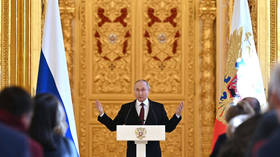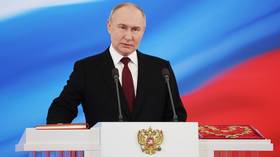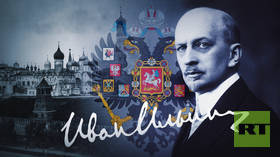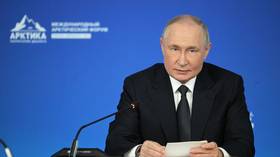‘Making mistakes is acceptable; lying is not’ – new Russian defense minister in quotes
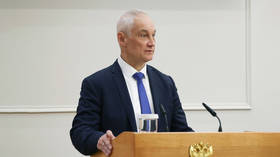
Andrey Belousov has officially become the ninth minister of defense in the history of modern Russia. He was nominated by President Vladimir Putin on May 12. The decision was unexpected, as he is the first civilian to hold the post. Belousov has never served in law enforcement agencies and spent most of his career working as an academic economist.
At the same time, Belousov is a longstanding member of the Russian political elite who has held important government positions for the past 20 years. In these years, he has demonstrated his professionalism and his unique vision of Russia’s future.
To help get a better idea of who Andrey Belousov is, RT has compiled a selection of quotes from the new defense minister’s recent speeches and interviews.
Relations with the West and Russia’s mission
[Russia should follow the path of] modernized conservatism… Russia can preserve traditional Western values. The West has abandoned these traditional values and moved on to something else – to an anti-traditional [mindset] within the framework of postmodernism.
[It is important to] preserve traditional Western values, which in a certain sense are the values of Western Christian civilization, European civilization. And Russia can become the guardian of these values. This may sound like a paradox, but it’s true. In this respect, it would be wrong to call the West our enemy…
But in the West, there are certain elites… and considerable parts of society that are associated with traditional values. And in this respect, they may grasp at this straw, this chance which Russia offers them to preserve some [of their values].
On the global world
It would be more correct to talk about turning towards the South, not just the East. But in itself, the word ‘turn’ is rather sly, because it implies the ideology of the global world. The global world – at least in the minds of its ideologists – was monocentric. It was composed of the Anglo-Saxon core and ‘old’ Europe which joined it, and together they ruled the world. And then, we somehow fit into this world. By the way, that’s true, we really tried to fit in… But now, we have been sort of thrown out. Though we left on our own as well.
But the ideology of a multipolar world is about developing a certain self-dependence, similar to [Carl] Jung’s concept of the Self. It is different from the ‘persona’, or ‘mask’ that one wears. All sovereign countries should possess this [concept of the] Self. Countries that are not sovereign, by definition, cannot possess it. I deeply respect countries like Holland, the Netherlands, [but] they do not possess sovereignty.
On the ‘Selfhood’ of a nation
There is no other option for our country but to acquire or rediscover this Self. Some say that we have huge resources, we have talented people. That is true. But the most important prerequisite for [forming] our Self is great culture. We have our own cultural code, our own cultural identity, which most countries and peoples do not have. By the way, Dostoevsky felt it very well. Dostoevsky, especially in works such as ‘A Writer’s Diary’, expressed it 100% precisely. And many other writers of the 19th and 20th century [spoke about this] too. That is our most important resource, which we must use.
We need people to understand that they carry within themselves this cultural code. [This should be done] through various mechanisms – through patriotism, through education, through the experience of their fathers and grandfathers… If we solve this problem, economic tasks will be secondary. They are complex, but I am sure that we will solve them, because essentially, we have everything that we need to achieve this.
On Russian elites
Everyone cannot look in the same direction. This has never happened in the past and will never happen. Especially in our country. Our country has always been marked by divided values and this situation always becomes worse during periods of reform. Whether it’s Peter [the Great’s] reforms... We call him Peter the Great, but in those times, some called him the antichrist and anathematized him. And I’m not even talking about the [Russian] revolution, when our officer corps split in two: 50% supported the Reds [the Bolsheviks] and 50% supported the Whites [anti-communist forces that fought the Bolsheviks]. Who were these people? They formed the elite. But a particular kind of elite.
The same thing happened in the 1990s, when a major split occurred in our society.
It is quite difficult, [even] impossible and counterproductive to force everyone to move in a certain direction. But there must be a certain core [of society] that will go and create this environment… This core has nothing to do with economics, it is about meaning.
On what Russia has to offer
Considering the situation, I would put food [production] in the first place, because Russia possesses a significant part of the world’s fertile lands. Of course, there is also energy, including energy services and energy security. Russia can [also] offer military security. In some fields, Russia can offer technology and in others, logistics, because a number of transcontinental transport corridors pass through Russia. So, we have something to offer the world.
On Russia’s strategy in the next decade
What strategy should a large national economy, such as Russia’s, adopt in the nearest five to ten years? The answer is quite simple: It needs to ensure strategic sustainability, and this is possible only through the formation of sustainable country alliances. Therefore, the essence of Russia’s strategy should be to build alliances with friendly countries…
A new bipolar structure is emerging, [but also] a new confrontation between blocs. In my opinion, this is not quite right. We should rather consider a system of alliances – such as when different major players enter into different alliances, including multilateral and bilateral ones. And the result is what we call a multipolar world.
On sovereignty
Sovereignty does not imply complete independence. Sovereignty means that the country and society are able to achieve their national goals. If you can set goals and achieve them, then you are a sovereign country. China, India, Indonesia can do this, but Europe can’t. Europe has lost its sovereignty. And I’m not even talking about other countries that we all know about. This is not due to the fact that there is a political dictatorship there, or something like that. Simply, something is missing, you know what I mean? [The concept of] sovereignty implies both the state of a society, its cultural identity, and the availability of resources for further development.
In the early 2000s, Russia also had trouble finding balance, but it moved on. But I want to say that when the country is in a difficult situation or at a crossroads, the mobilization model of the economy is not the only choice, that’s the point.
On the objectives as minister of defense
We are currently conducting a special military operation. Naturally, the most pressing and immediate issues are related to this. Primarily, this involves the provision of the most advanced military and specialized equipment, artillery ammunition, missiles, personal protection gear for soldiers, communication devices, drones, electronic warfare tools, and so forth. The scope of these issues is vast. Each direction has monthly plans, but their execution demands daily, and often hourly, attention. This is the first thing.
Secondly, the enemy adapts quickly. The landscape of new technology usage is changing on a weekly basis. In this context, we must not only learn and keep up but also anticipate the enemy’s moves. This effort, coordinated with the General Staff, is ongoing but also requires daily involvement – we must analyze the application of new technologies and develop new combat methods.
It is essential to ensure the full integration of the Armed Forces’ economy into the broader national economy. Given the objective increase in defense spending, which has now exceeded 6.7% of the country’s GDP, this task is complex and multifaceted, primarily involving the optimization of military expenditures. I want to emphasize that optimization does not mean indiscriminate cuts; it means increasing efficiency.
Everything effective and advanced in our country must contribute to achieving victory and fulfilling the Armed Forces’ objectives. I am fully aware of my responsibility to the country, the Russian people, and the president of the Russian Federation. In line with my anticipated appointment, I pledge to dedicate all my efforts, health, and if necessary, my life to achieving the assigned tasks. I will be guided by an unwavering principle: ‘Making mistakes is acceptable; lying is not’.
